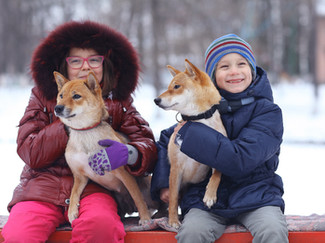What Should I Look For When Choosing a Trainer?
You brought home your dog, you’ve practiced your basics and you've come to the conclusion that you need a professional to get your dog where you want them to be. As you pull up Google you are flooded with name after name, company after company. So what do you do? How, with so many others out there, do you decide which trainer is best for you and your dog? How do you know what trainee will really listen to you? What are some green flags to look for? What are some red ones to avoid?
The first thing to consider is the style of training you want; are you looking for a strict style, do you want a dog that marches or a friend you can comfortably walk with? Do you need your dog to win awards or do you just want them to understand what you are saying? Do you prefer to be more involved with in-home training or classes, or would you rather take a step back and board and train? Figuring these things out will help you narrow down a trainer quickly. Let's look at some red flags in trainers that may be best avoided.
Red Flags

Avoids a straightforward answer.
There should be nothing to hide from you, and if this is the person you are trusting with your dog there should be complete transparency. Sometimes the answer to a solution doesn’t sound pretty, but a trainer should be able and willing to explain their reasoning as to why they believe this is the best solution.
Uses “old-school” tactics and rejects modern science.
Science with dogs has come a long way in the last few years, with topics such as “alpha theory” and “pack theory” being widely disproven, any trainer still quoting them should be treated with caution. Their methods may still work, but the actual reason why may not be the best or healthiest choice for you or your dog.
Openly slanders and puts down other trainers with name dropping.
We all have trainers and companies we don't like or approve of, but it is no excuse to openly defame one another just to make a sale. Any trainer that readily puts down another’s methods and styles needs to be asked why, and questioned on why their methods are so perfect.

Doesn't listen to what you want, only focused on getting your dog to “perform.”
There are a lot more important things in the world than getting your dog to have the fastest down, the most beautiful prancing heel, and the sharpest sit. The things YOU want should take precedence and while the other commands may be necessary, depending on what you need, how fast or how flashy they look should not take center stage. Trainers focused on style and flashiness often do it for posting purposes, and while it is fine to want to advertise their work. It should not come at the detriment of your training.
Well then, what are some green flags? What should you look for that is positive when on the hunt for a trainer?
Green Flags

Honesty.
We don't have all the answers all the time. A lot of trainers have seen a lot, but none of us have truly seen it all. There will come times where we need to step back and think of a solution because it isn't readily available. We may need to consult another trainer. We want the best for you and your dog and it is okay for us to pause and say “we will find a solution for that, but we don't have one right this second.”
Constantly evolving.
As science changes and our understanding of the dog mind and their learning process broadens, a trainer should be willing and capable of adapting to best benefit you and your dog. No two dogs are alike, even within the same breed, so no two methods will be exactly the same. Flexibility is key in any training regiment.

Having a network.
Trainers are great at what they do, but what they do may not be everything. No man is an island. A trainer with a network of other trainers and others in the dog industry is a huge benefit, for them and you. Where one may be an expert with aggression, another may be more fine tuned for agility or service work. What is a good groomer that you recommend? What about vets? They should have answers to these inquiries to continue you and your dog on a productive path with like-minded people.
Knowledge.
Even before training starts, after assessing your situation and learning more about you and your dog, a trainer should be able to tell you WHY something is happening - even if they aren’t immediately giving you a solution. Your Great Pyrenees is reactive because it is bred to protect its herd, it's not aggressive, it's protective. Your Australian Shepherd nips your kids' ankles because they were bred to corral large flocks of sheep. Your Lhasa Apso barks because it was bred as an alarm dog in Buddhist temples. Knowing why and being transparent about it will help you then understand the method in resolving it when you eventually sign the contract and begin work on resolutions together.
Equipment.
A trainer should be educated in various tools, even if they don't necessarily use them. When is an appropriate time to use a harness? What are the pros and cons of a prong collar? An e collar? Long leash vs. Retractable? These should be questions they can answer and while they may have a preference or expertise using one tool over another - they should be able to educate you about each tool's uses and how they can be used safely for your dog.
There are plenty more flags, both red and green, and each flag will be a little different for every individual. Learning what you want from training and understanding that a certain trainer or certain method may not fit your lifestyle is important in choosing the best one for you. Here at Final Call Dog Training we want to see you and your dog succeed, and put your best foot (and their best paw) forward as you journey together through life.






Comments